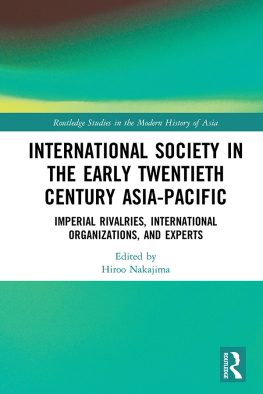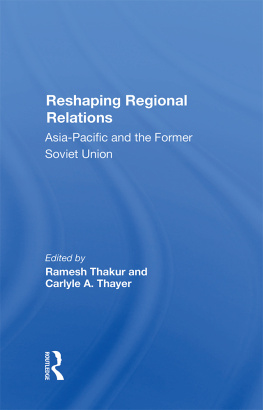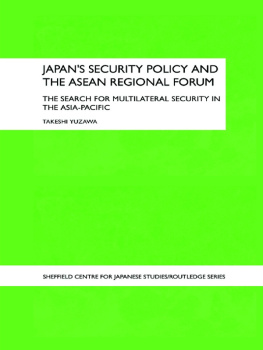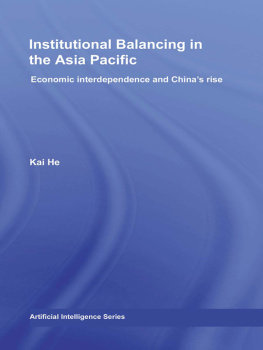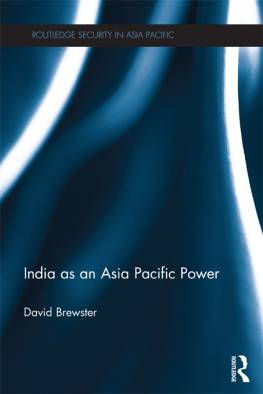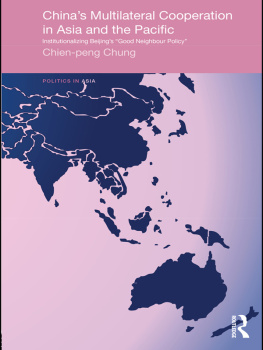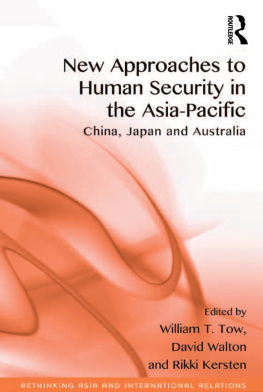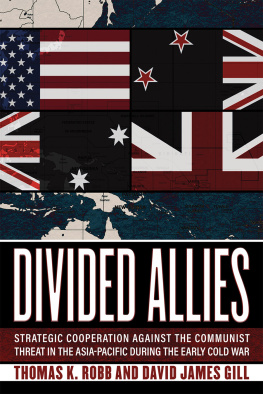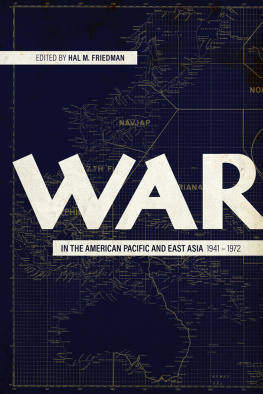International Society in the Early Twentieth Century Asia-Pacific
Concentrating on the rivalry between the formal and informal empires of Great Britain, Japan and the United States of America, this book examines how regional relations were negotiated in Asia and the Pacific during the interwar years.
A range of international organizations including the League of Nations and the Institute of Pacific Relations, as well as internationally minded intellectuals in various countries, intersected with each other, forming a type of regional governance in the Asia-Pacific. This system transformed itself as post-war decolonization accelerated and the United States entered as a major power in the region. This was further reinforced by big foundations, including Carnegie, Rockefeller and Ford. This book sheds light on the circumstances leading to the collapse of formal empires in the Asia-Pacific alongside hitherto unknown aspects of the regions transnational history.
A valuable resource for students and scholars of the twentieth century history of the Asia-Pacific region, and of twentieth century internationalism.
Hiroo Nakajima is Professor in the Osaka School of International Public Policy at Osaka University, Japan.
Routledge Studies in the Modern History of Asia
154. Malaysia and the Cold War Era
Edited by Ooi Keat Gin
155. Chinese Hinterland Capitalism and Shanxi Piaohao
Banking, State, and Family, 17201910
Peter Shapely
156. Eisaku Sato-, Japanese Prime Minister, 196472
Okinawa, Foreign Relations, Domestic Politics and the Nobel Prizer
Ryuji Hattori
157. Japans Pan-Asian Empire
Wartime Intellectuals and the Korea Question, 19311945
Seok-Won Lee
158. Britain, Japan and China, 18761895
East Asian International Relations before the First Sino-Japanese War
Yu Suzuki
159. A History of the Modern Chinese Navy, 18402020
Bruce A. Elleman
160. Planting Parliaments in Eurasia, 18501950
Concepts, Practices, and Mythologies
Edited by Ivan Sablin and Egas Moniz Bandeira
161. Chinese Theatre Troupes in Southeast Asia
Touring Diaspora 1900s1970s
Beiyu Zhang
For a full list of available titles please visit: https://www.routledge.com/Routledge-Studies-in-the-Modern-History-of-Asia/book-series/MODHISTASIA
First published 2021
by Routledge
2 Park Square, Milton Park, Abingdon, Oxon OX14 4RN
and by Routledge
605 Third Avenue, New York, NY 10158
Routledge is an imprint of the Taylor & Francis Group, an informa business
2021 selection and editorial matter, Hiroo Nakajima; individual chapters, the contributors
The right of Hiroo Nakajima to be identified as the author of the editorial material, and of the authors for their individual chapters, has been asserted in accordance with sections 77 and 78 of the Copyright, Designs and Patents Act 1988.
All rights reserved. No part of this book may be reprinted or reproduced or utilised in any form or by any electronic, mechanical, or other means, now known or hereafter invented, including photocopying and recording, or in any information storage or retrieval system, without permission in writing from the publishers.
Trademark notice: Product or corporate names may be trademarks or registered trademarks, and are used only for identification and explanation without intent to infringe.
British Library Cataloguing-in-Publication Data
A catalogue record for this book is available from the British Library
Library of Congress Cataloging-in-Publication Data
A catalog record has been requested for this book
ISBN: 978-0-367-89572-3 (hbk)
ISBN: 978-0-367-75192-0 (pbk)
ISBN: 978-1-003-01988-6 (ebk)
Tomoko Akami is Associate Professor (Reader) in the College of Asia and the Pacific at Australian National University, Australia.
Jon Thares Davidann is Professor of History at Hawaii Pacific University, Hawaii.
Izumi Hirobe is Professor in the Faculty of Political Economy at Meiji University, Japan.
Seiko Mimaki is Associate Professor in the Faculty of Economics at Takasaki City University of Economics, Japan.
Hiroo Nakajima is Professor in the Osaka School of International Public Policy at Osaka University, Japan.
Nobuyuki Nakamura is Part-time Lecturer in the Institute of Liberal Arts at Otemon Gakuin University, Japan.
Yutaka Sasaki is Professor in the Faculty of Foreign Studies, Kyoto University of Foreign Studies, Japan.
Yoshie Takamitsu is Associate Professor in the Graduate School of Global and Transdisciplinary Studies at Chiba University, Japan.
This book is based upon my research project generously supported by the Japan Society for the Promotion of Science KAKENHI Grant Number 15H03320. It was a four-year project that started in April 2015 and culminated in the workshop held at Osaka University in December 2018. The project brought together strenuous researchers on the history of the Asia-Pacific from North America, Australia, and Hawaii as well as Japan as the chapters included, I believe, amply demonstrates. I would also like to thank Ryoko Iechika, Masato Karashima, and Masaki Fujioka who participated in one of the workshops and shared with us their deep understanding of the issues concerned: Professor Iechika on the China Institute of Pacific Relations, Professor Karashima on Japanese Asia experts, and Mr. Fujioka on the foundation-university nexus in the United States. In addition, thanks to Professor Ken Ishida, Takeshi Ishida, Professor Emeritus at the University of Tokyo, kindly shared his memories of conferences that Chapter 7 deals with.
The project has been closely related to the activities of Global History Division, Institute for Open and Transdisciplinary Research Initiatives (OTRI) at Osaka University as well. I am grateful to its director Shigeru Akita who also took part in the above December 2018 workshop. Owing to my affiliation with Professor Akitas various global history initiatives, I was fortunate enough to present a part of my chapter in Nodes, Networks, Orders: Three Global History Workshops on Transformative Connectivity held in Leiden on April 2022, 2017, which celebrated the fortieth anniversary of Itinerario, a leading journal on transnational and global history.
Simon Bates, editor at Routledge, and Jacy Hui, editorial assistant there, showed me what professional editing is with their devotion and kindness.
Last but not least, a special thanks to all the contributors who devotedly cooperated with me through the course of the research and to Professor Sayuri Shimizu Guthrie who tried her best to contribute when COVID-19 devastated Texas in the summer of 2020.
Hiroo Nakajima
This is a book about the emergence, decline, and regeneration of international society in the Asia-Pacific
Echoing recent cultural turn in international history and a call on more transnational and global history, there exist important contributions to our understanding of twentieth-century international society. For example, Daniel Gormans Emergence of International Society in the 1920s forcefully demonstrates that the origins of the present global governance emerged right after World War I. It is one of the innovative representatives in the new field. Michael R. Auslins

